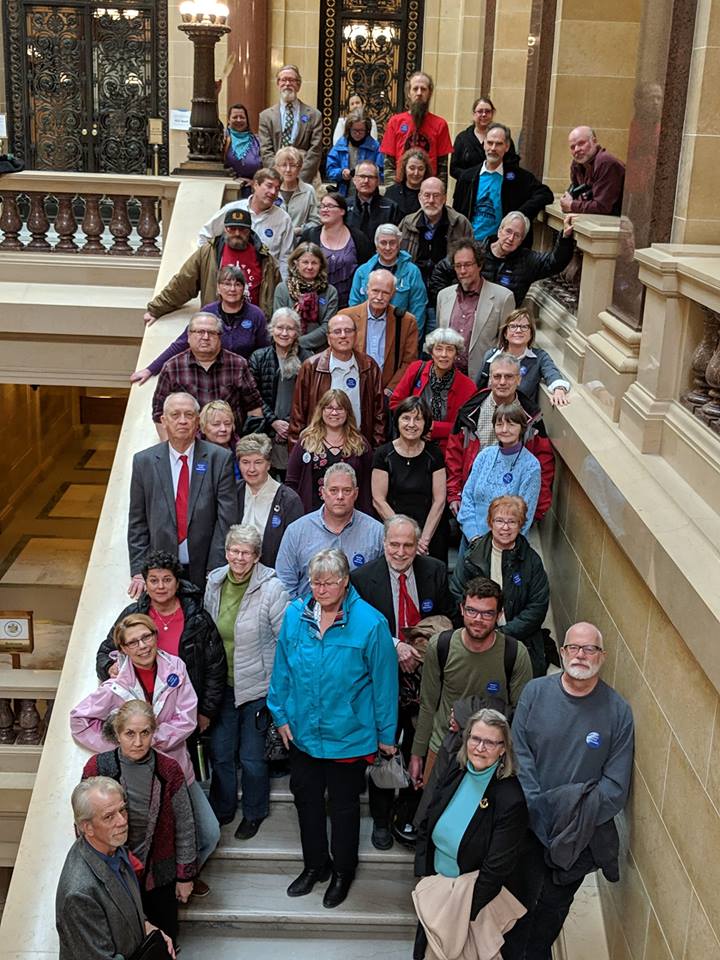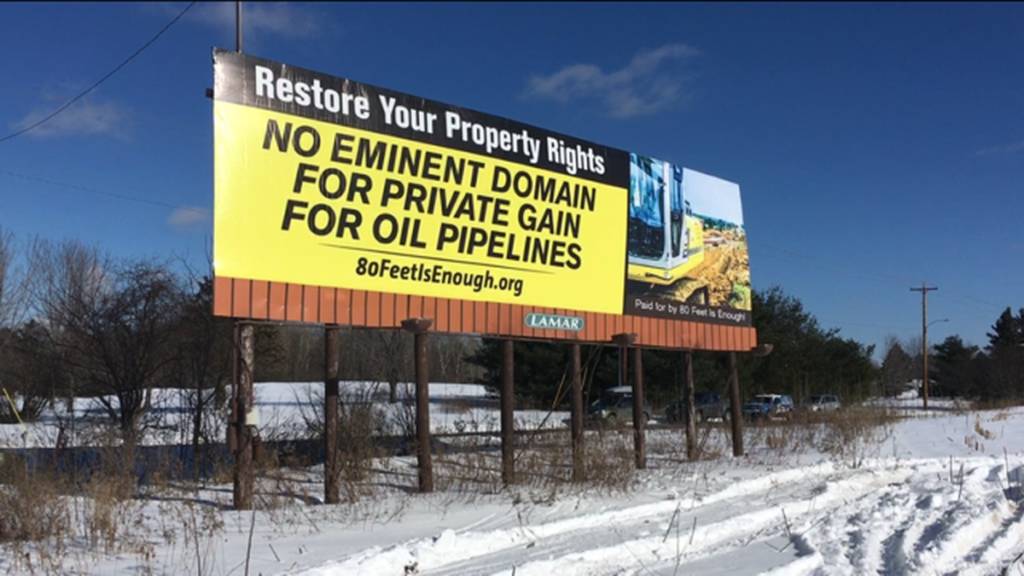The 350 Madison Tar Sands Team has successfully confronted the expansionist ambitions of Enbridge Energy, a Canadian company, locally in Dane County and throughout Wisconsin.
Enbridge has been working to expand its pipeline network throughout the Midwest to transport tar sands from the Canadian boreal forests to the Gulf Coast, primarily for export. Confronted with effective campaigns on Canada’s east and west coasts opposing export plans, Enbridge has targeted the Midwest as a tar sands freeway to get the oil south.
Enbridge’s Line 61 travels through Wisconsin from Superior to Delavan (click here for map), then crosses the Illinois state line and continues south to refineries. Enbridge recently tripled Line 61’s capacity from the original 400,000 barrels per day (bpd) to 1.2 million bpd—45% more than the Keystone XL and 155% more than the Dakota Access Pipeline.
But Enbridge’s plans didn’t stop with the Line 61 expansion. The company conducted surveys for a Line 61 “Twin” (aka Line 66) that would carry an additional 1.2 million bpd through the same corridor. Plans for a Line 61 Twin appeared in Enbridge’s 2015 and 2016 investor reports.
Once 350 Madison and our allies began organizing in earnest against any new pipeline, Enbridge changed course, at least publicly, denying any intention to build a new pipeline and removing mention of the “Twin” from its reports. But astute observers pointed out that without a “Twin,” a glut of oil would back up in Superior, Wisconsin, especially if Enbridge’s so-called Line 3 “replacement”—approved by the Minnesota Public Utilities Commission in June 2019 but still under challenge in court—were to be constructed, adding an additional 535,000 bpd.
The 350 Madison Tar Sands Team fought the Line 61 expansion here in Dane County and organized up and down the state against the construction of a new Line 66, as explained below.
Fighting Line 61 expansion in Dane County
350 Madison played a pivotal role in Dane County’s stand against Enbridge expansion. Enbridge came to the county in 2014 seeking a permit for a new pump station to enable the company to triple the flow of oil through Line 61. Other counties along the pipeline had readily agreed. But we convinced Dane County’s Zoning and Land Regulation Committee to impose a precedent-setting cleanup insurance requirement on Enbridge. Not long after, the GOP Wisconsin Legislature nullified the action via an 11th-hour budget amendment that precludes a county from requiring a pipeline company to obtain insurance if the company already carries comprehensive general liability insurance with coverage for sudden and accidental pollution liability.

Photo credit: Trish Kaiser
Enbridge sued the county over the insurance requirement, while our team helped landowners bring suit against Enbridge, asserting that the statute precluded enforcement by counties but not citizens. The Dane County Circuit Court ruled for Enbridge, but in May 2018, the Wisconsin Court of Appeals reversed, holding that the county and its landowners had the right to know they would be protected in the event of a spill and underscoring that the insurance condition was “integral to the consideration of a permit.” The court further concluded that Enbridge had failed to show it carried the type of insurance required to trigger the statute.
In late June 2018, Enbridge appealed the decision to the Wisconsin Supreme Court. The court granted review and took the unusual step of hearing oral arguments in the case on March 26, 2019. Three months later, on June 27, the conservative court reversed the Court of Appeals in a 4-1 decision (see this blog post for an analysis).
Despite this disappointing outcome, it can be said that 350 Madison’s efforts delayed the Line 61 expansion for nearly three years, reducing tar sands transport through Wisconsin and costing Enbridge dearly. For more on the case, see 350 Madison vs. Enbridge.
Building a Movement Against Line 66
While we were fighting Enbridge’s Line 61 expansion in Dane County, we were also building a movement to oppose Line 66 up and down the pipeline corridor. With the John Muir (WI) chapter of the Sierra Club and other concerned groups, we were one of the founding members of the Wisconsin Safe Energy (WiSE) Alliance, which was established to provide a “big tent” bringing people together around shared concerns about the risks pipelines pose to land and water, crops and livestock, and beloved outdoor places. WiSE chapters and partner organizations have educated neighbors, attended Enbridge “open houses” to challenge the company’s misleading statements, and led the effort to pressure the Wisconsin Legislature to ban the use of “eminent domain for private gain.” This was in response to a Wisconsin state budget amendment that Enbridge had a hand in crafting that made Enbridge eligible to condemn the land of unwilling landowners. (See the WiSE series of video interviews with landowners here.)

Photo credit: 80 Feet Is Enough
With four pipelines in the Line 61 corridor, Enbridge’s 80-foot easements are at capacity, making it likely the company would turn to eminent domain to acquire more land for a new pipeline. When the company began opening discussions with landowners about new easements—seeking as much as an additional 200 feet—landowners came together to form 80 Feet Is Enough. That group has played a critical role in developing the movement to oppose Line 66 and educating citizens about pipeline safety and eminent domain.
To help landowners facing pressure from Enbridge, members of 80 Feet Is Enough and the WiSE Alliance founded the Wisconsin Easement Action Team (WEAT) in 2016. WEAT offers legal support to landowners in their dealings with Enbridge over land surveys, easements, and eminent domain. Attorney Brian Jorde, who represents landowners in the Nebraska Easement Action Team (NEAT) in the fight against the Keystone XL, is WEAT’s attorney. WEAT has since expanded to represent landowners facing encroachment by Enbridge’s proposed Line 5 reroute in northern Wisconsin, as well as Illinois landowners concerned about pipeline expansion.
Building a Powerful Coalition
Throughout, our goal has been to mobilize a broad, diverse, and sustainable coalition working against fossil fuel expansion. We have worked with allies locally, regionally, and nationally to bring such expansion to a halt.
Our closest working relationship is with the Wisconsin chapter of the Sierra Club; our respective tar sands staff and volunteers collaborate on local, statewide, and regional strategy and action, cooperating with WiSE, WEAT, and 80 Feet Is Enough. We support and develop regional strategy with the Great Lakes Tar Sands group, a coalition of organizations fighting Enbridge pipelines, including MN350 (Line 3) and Save Our Illinois Land (SOIL; Lines 61 and 66). Other key allies include the Youth Climate Action Team; 350 Chequamegon Bay; tribal allies such as Honor the Earth; and groups focused on threats to waterways, such as the Washburn County Lakes and Rivers Association, Friends of the Headwaters, and the St. Croix River Association.

Photo credit: Monika Blazs

